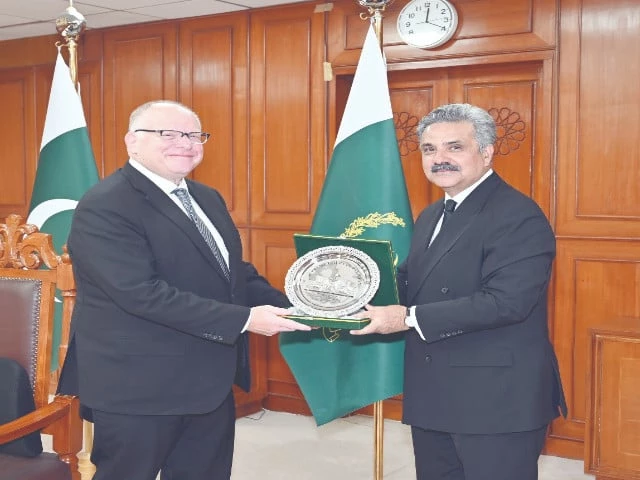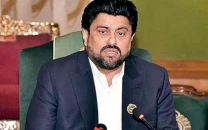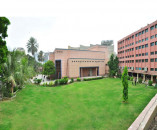CJ sends Imran's letter to Constitutional Bench
Afridi seeks govt, opposition input on reforms Stresses on system continuity amid challenges Tells IMF delegatio

Chief Justice Yahya Afridi said on Tuesday that serious issues had been raised in a letter penned by Pakistan Tehreek-e-Insaf (PTI) founder Imran Khan. As a result, he referred the letter to the judges' committee of the Constitutional Bench of the Supreme Court for a decision.
Speaking to media persons after a visit to the apex court by a delegation of the International Monetary Fund (IMF), Chief Justice Afridi said that he had sought suggestions from both the government and the opposition before convening a meeting of the National Judicial Policy Making Committee (NJPMC).
He confirmed that a letter from the PTI founder had been received. "What the founder of PTI wants from us relates to Clause 3 of Article 184 of the Constitution. The letter has been sent to the Constitutional (Bench) Judges Committee," he said.
"This matter pertains to Article 184(3), so it should be reviewed by the Constitutional Bench," he added.
Responding to a question, the chief justice mentioned that he had been receiving a lot of letters lately. "I have also received a letter from Prime Minister Shehbaz Sharif," he revealed.
When asked about resolving differences within the judiciary, Chief Justice Afridi acknowledged that these were long-standing issues that would take time to address. "I have advised the judges to let the system functiondon't obstruct the system," he emphasized. "Pakistan belongs to all of us."
The issue of seniority was raised during the Judicial Commission of Pakistan (JCP) meeting, Chief Justice Afridi revealed.
"In my opinion, the issue of seniority is linked to the judicial power of hearing," he said. "I have already given my stance on seniority, so if this matter comes before the Supreme Court, I will not sit on that bench."
He further stated that he and the Attorney General for Pakistan (AGP) shared the same opinion on the matter. However, he emphasized that judges' transfers were enshrined in the Constitution and warned against mixing up transfers with seniority.
"Those who boycotted the meeting should have waited just one more day," he remarked.
Explaining his decision to bring Justice Miangul Hassan Aurangzeb of the Islamabad High Court (IHC) to the Supreme Court, CJ Afridi noted that some judges who previously handled corporate cases were no longer hearing them. "I am in favor of elevating Justice Miangul Hassan Aurangzeb to the Supreme Court," he said.
IMF delegation
Speaking about the judicial reforms, he said that before the NJPMC meeting, suggestions had been sought from Prime Minister Shehbaz Sharif and the opposition leader. He added that he also informed the IMF delegation about the agenda of the NJPMC.
The chief justice said that the IMF delegation wanted to know about compliance with the agreements and the property rights. "I replied that we are making reforms on this," the chief justice said. He further said that he told the IMF delegation that it was not his job to tell them everything.
Later, the Supreme Court issued a statement, saying that an IMF delegation, led by Joel Turkewitz, met with Chief Justice Yahya Afridi. The meeting was also attended by the Supreme Court registrar, the JCP supreme, the Law and Justice Commission secretary, and the Federal Judicial Academy (FJA) director.
The chief justice informed the delegation that the judiciary was not used to have direct interaction with such missions, but since the Finance Division had requested, this interaction was taking place. "He said he would be quite guarded to his comments and views," the statement read.
During the meeting, according to the statement, the chief justice highlighted key constitutional developments with respect to the JCP and the reforms, including senior-level judicial appointments, judicial accountability, and the restructuring of the JCP.
He elaborated on the merits of integrating the judiciary and the parliamentary committee to ensure a more transparent and efficient judicial selection process. He also informed that the Supreme Court was finalising a critical agenda for the upcoming NJPMC meeting expected in the last week of February.
Discussions during the meeting centred on judicial accountability and the mechanisms for addressing complaints against judges. The chief justice emphasised the importance of a robust and fair accountability process to uphold the integrity and independence of the judiciary.
The IMF delegation acknowledged the judiciary's role in maintaining legal and institutional stability and expressed its appreciation for the ongoing reforms aimed at strengthening governance and accountability. The discussion reaffirmed a shared commitment to enhancing judicial efficiency.
Meanwhile, the PTI decided to contact the IMF delegation, lawyer Faisal Chaudhry confirmed on Tuesday, while talking to the media outside the Adiala Jail. He said that the PTI founder had allowed National Assembly Opposition Leader Omar Ayub and the PTI's JCP members to meet with the IMF.



















COMMENTS
Comments are moderated and generally will be posted if they are on-topic and not abusive.
For more information, please see our Comments FAQ